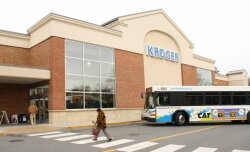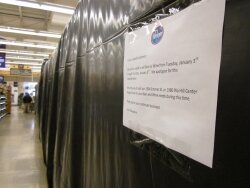ABC superteen: How an underage agent took down Kroger
For many restaurants and bars, the prospect of a visit by undercover ABC agents is a constant fear. A single alcohol violation could trigger temporary loss of a liquor license with devastating financial implications for a small business; multiple violations can, quite literally, spell the end of a livelihood. But what happens when the country's biggest grocery store chain is targeted by ABC?
On January 3, shoppers at the Barracks Road Kroger found out. Anyone eager for a bottle of vino or a six-pack of suds arrived to find the store's extensive alcohol offerings unavailable. Black-plastic-covered plywood surrounded the massive wine department; the beer shelves were similarly blocked. Signs posted by management apologized to customers and suggested they make alcohol purchases at Kroger's two other Charlottesville locations but offered no explanation for the three-day dry spell. It involved a superteen.
"The date of the violation was November 2; the charge was selling to underage," reveals Virginia ABC spokesperson Rebecca Gettings, who says the store's infraction was selling a single 24-ounce can of Bud Light to an 18-year-old.
Unfortunately for Kroger, America's largest supermarket chain, this particular 18-year-old wasn't the average buzz-seeking teen. It was an underage operative, a being so powerful he or she is able to turn a single $3 purchase into thousands of dollars in fines and lost sales in a single bound.
According to another ABC spokesperson, Carol Mawyer, there are 109 of these operatives who visit stores accompanied by an ABC agent. An undercover underager attempts to make a purchase, says Mawyer, and if asked for ID, presents his or her own actual driver's license. If a sale is made, the teen leaves the store with the goods and hands off the evidence to the agent, who issues a criminal citation to the clerk and an administrative citation to the store.
In the Kroger case, clerk Joshua Thacker, 20, was charged with selling to an unauthorized person, according to Mawyer. He was sentenced to six months probation and 30 hours of community service and will return to court on June 4.
Repeated entreaties to Kroger's corporate office in Roanoke produced no response. However, the only grocery store in town employing its own sommelier, a wine expert, would appear to have suffered sales losses amounting to thousands of dollars– and that's not counting the $4,500 fine the store also paid.
Kroger is not the only local business to feel the sting of a sting– but it does seem to be the only national grocery chain in Charlottesville hit by the ABC for underage sales in the past two years. A check of ABC records indicates Kroger was also cited on October 29, 2010.
Far more frequently, it's small, locally owned restaurants cited; the impact, says one local restaurant owner, can be devastating.
"The smallest infraction can have a catastrophic effect," says Mike Rodi owner of Rapture restaurant and R2 nightclub on the Downtown Mall.
"I also think there are so many laws that even ABC agents don't know how to explain what their function is," says Rodi, citing the ABC's happy-hour discounting rules which include an advertising ban. "Businesses," says Rodi, "should be allowed to sell something for the price they want to sell it for."
The topic of ABC arcana has been reviled in essay form and parodied in an award-winning short documentary called The ABCs of Virginia Alcohol Law. Among the frustrations is a rule forcing establishments to earn at least 45 percent of their revenue from food. Rodi contends that may encourage establishments to charge less for drinks, a scenario which could lead customers to drink more.
Rodi also mentions the state's ban on any post-2am drinking, a measure that even forbids staffers at late-night venues from legally enjoying a post-shift cocktail with colleagues. Rapture learned that the hard way in April 2009, when it was hit with a fine of $1,000 and a 10-day license suspension.
That echoed the scenario faced by Corner district establishment Boylan Heights last August. After selling alcohol to a minor in January 2011, Boylan Heights got a choice: a 30-day suspension of alcohol sales or a one-week suspension and a $3,000 fine. Choosing the latter, the restaurant attempted to turn the seven-day dry spell into a fundraiser for MADD. The organization, however, refused to accept the donations, and Boylan Heights owner J.R. Hadley did not return a reporter's calls.
If fines and license suspensions get taken in stride by mega-chain like Kroger with over $80 billion in annual revenue, locally-owned restaurants might suffer a fatal blow from, say, a month-long alcohol ban.
"There's no way I could absorb losing my liquor license for 30 days," says Rodi.
But not every restaurant owner minds the ABC, which pays teens willing to go undercover $10 an hour.
"I've never had an agency violation in my life," says Peter Castiglione, a longtime restaurateur and owner of Maya restaurant on West Main. Staying on top of ABC regulations is key, as is hiring bar staff who stay up on the rules.
"I've had plenty of agents come in with 17-year-olds," says Castiglione, who praises his bar staff for their professionalism and vigilance. "They've caught every ABC agent that's come through," he boasts.
Still, while Castiglione says he doesn't begrudge ABC agents of any age doing their job, he is aware that any slip-up can be costly.
"You just have to be cautious," he says. "That's the reality of the situation."


11 comments
Isn't the name of the teenage in the public record because he is a state employee?
So these ABC officials, with no real jobs, are the ones that make teenagers half my age harass me for an ID whenever I'm buying alcohol when I'm obviously well over the age limit?
What a tremendous waste of public resources. Those teenagers should be banned from social functions with alcohol for life. I guess I can't place all of the blame squarely on their shoulders, thanks to the horrible economy it may be one of the only types of job they can get.
I would imagine that the cost of enforcment is less than the cost of one accident investigation from underagers driving drunk and killing themselves or others.
It should haover be a program that pays for itself through those fines.
I am okay with it so long as the kids look like kids.
Long ago, I worked at Kroger and the ABC came in and spoke to us about how to enforce the laws. Believe it or not a clerk at another grocery store accepted an ID for a kid - and this kid LOOKED 12 with braces too - and he bought beer. As a teenager - we all knew where to go (and I looked older so I did get away with it more than most) to buy beer. It is a price we must pay to enforce these laws.
Thanks to sting operations like this one, teenagers never drink beer.
Is this a new tactic? In my high school, if it ever got out that somebody was moonlighting as a rat for the ABC, they probably would've had to change schools.
There is nothing underhanded about these operations.The ABC brings these kids in and they see if you are doing your job.These kids have to use their own,real ID.(No fake ID'S are used.)If you ask them"are you old enough to buy this?"or something to that effect,they are not allowed to lie.The ABC selects the most baby-faced kids they can find,kids it should be obvious that need to show their ID.Again,they are just checking to see if you are doing your job.
Alot of times the Agents will use kids from different jurisdictions. So a high school kid of a surrounding county would be used at a Charlottesville location. Its not a fun job for the Agents and its not a fun job for the kid buying the alcohol.
Moonshiners never ask for ID.
And neither do drug dealers
HA! They don't just use the kids ids - and I agree with Chuck Bartowski here - no one I went to school with ever did this. We could identify the ABC officers 10 miles away.
ABC Officers if they know of a place kids will go to buy beer will stake it out and watch to see if the kids come in and buy. They will then bust the kid and site the store too and the clerk who sold the goods.
I believe that it is done less now because of the laws of cigerette sales. When I was a kid a 5 year old could go to the store and buy them for a parent - not today.
Retailers make a whole lot of money off of sales of these restricted items. If they want to continue to make the sales - they must enforce the law.